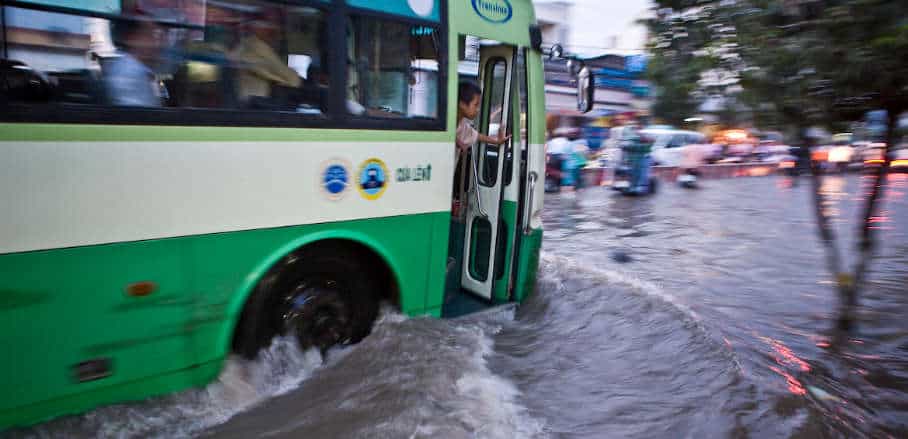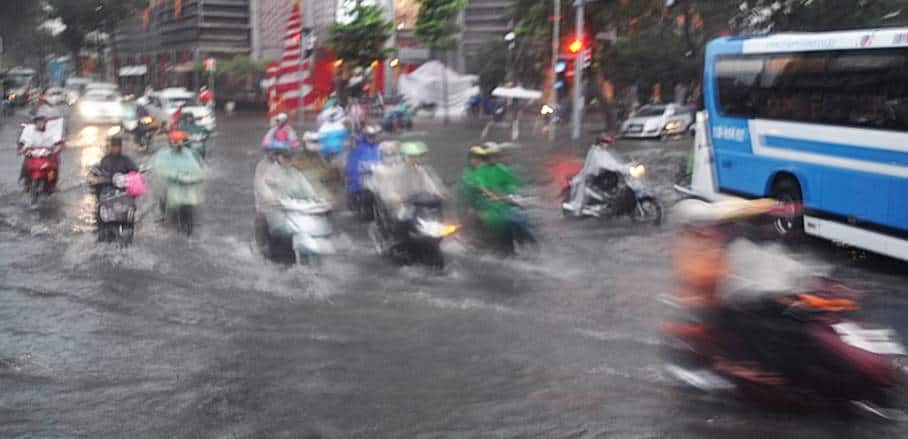Climate-Proofing Urban Bus Systems in Vietnam
The detrimental impact of extreme weather on Ho Chi Minh City’s traffic system is one of the city’s most urgent challenges. Frederic Tesfay outlines ways to increase the resilience of the urban bus system.
Like many coastal countries, Vietnam is already feeling the impacts of rising sea levels and intense storms brought on by climate change. Its location in the Mekong Delta and surrounding the Saigon River makes Ho Chi Minh City (HCMC) prone to severe flooding. Overflowing canals during heavy rainfall can create paralysis in the transport system and damage infrastructure, impacting the city’s estimated nine million residents.
When already congested roadways come to a standstill during these rains, the bus network that comprises the public transport system comes to a halt. Ensuring a continuation of its services is key to keeping traffic running smoothly. Hence, officials in Vietnam work toward improving drainage, building dams and levees, and enhancing green infrastructure.
Being Prepared for Disruptions Using Big Data
The TUMI Labs initiative is supporting them to bring together all available data and bridge the silos between different departments and bus operators to effectively model contingency plans to help mitigate traffic congestion and find solutions to issues with the bus transport system during flooding.

TUMI Labs plans to develop a model that can better predict congestion due to flooding events. © flickr/Anh Đinh
The initiative actively collaborates with the authorities in HCMC to ensure the continuous operation of vital infrastructure during periods of heavy rainfall and tidal rise. By analysing weather data and historic extreme weather events, big data approaches are being developed to identify vulnerabilities in road infrastructure and changes in road user behaviour. The ultimate goal is to design a comprehensive digital tool that will assist city authorities in their planning processes before, during, and after heavy rains to ensure continued bus operations.
While the ownership of the project lies with the HCMC Department of Transportation, the Vietnam-German University (VGU) is leading the work by providing its technical expertise and engaging with the relevant stakeholders to develop a data framework for measuring disruptions in real time.
Adapting Bus Routes in Real-time
In a first step toward mitigating the effects of severe weather, TUMI Labs plans to develop a model that can better predict congestion due to flooding events. Collecting data and analysing it with the use of algorithms will provide valuable insights to officials in Vietnam who can work to adapt to the future by climate-proofing roadways to ensure continued operations. The main goal is to prototype solutions that can relieve the congestion for the nearly 2,084 private and public-operated buses that travel along some 127 bus routes.
Among the data already available for collection are billions of bus-GPS points, thousands of camera feeds that track traffic flow and accidents throughout the city, weather data, congestion reports, traffic violations, and e-payment systems. Using the information gathered, VGU is creating an algorithm to curtail transport delays by adapting the bus routes in real time. As the impacts of climate change become more severe, the city can also use this information on other extreme weather events and implement further flood protection infrastructure.
Attracting More Passengers by Reducing Road Congestion
Gaining such insights will help HCMC in achieving the goals of its sustainable mobility plan, getting more people onto public transport, and making their commutes run faster and more smoothly. At the moment, a bus company estimates that 5 of their 20 bus routes are prone to road congestion – particularly on line #27 during rush hour. Due to a lack of traffic prediction tools for assisting bus operation management systems, many passengers cannot use the bus routes and have long waits at the affected bus stops when sudden road congestion arises.
Moreover, the company cannot reroute the affected bus routes until they have sent two buses to the congestion point to prove the event in order to get approval for rerouting. Automated congestion prediction and rerouting processes based on the big data approach and machine-learning algorithms could help alleviate these issues for bus companies.
Expanding the Bus Network to Cover More Ground
At the same time, the city understands that it needs to improve its public transport system, which currently only covers around 7 per cent of the modal share. Also known as modal split, which mode of transport the city’s citizens use most is an important indicator to evaluate a city’s level of sustainability with regard to mobility. The TUMI initiative aims at motivating people to avoid using private vehicles, such as cars and motorbikes, and walk, cycle or use public transport instead.
Overcrowded roads due to private vehicles blocking the street create delays and prevent more people from taking advantage of this efficient form of travel. Thus, expanding the bus network will help to cover more ground. However, creating dedicated bus lanes is difficult due to the city’s topography and narrow streets – issues the city is currently looking into with TUMI Labs’ support.
To achieve this endeavour, the initiative can draw on previous cooperation with Vietnamese authorities. In 2018, the TUMI Challenge collaborated with the city of Hoi An to establish a bicycle-sharing system and a cycling infrastructure that includes a bike path. Though their implementation was seriously impacted by the COVID-19 pandemic and a drop in tourism, the success of the project is cemented in the continued use of the infrastructure along with an unrelenting commitment to reducing car and motorcycle use in favour of bicycles as a viable means of transport.
The concept, implementation processes, and first prototype digital solutions of the TUMI Lab are intended to be applied in other cities as well. GIZ and VGU develop plans to create a sustainable framework to allow continuous improvement of the tools and transfer the idea and product knowledge to other cities in Vietnam and around the world.
- Climate-Proofing Urban Bus Systems in Vietnam - 6. June 2023
